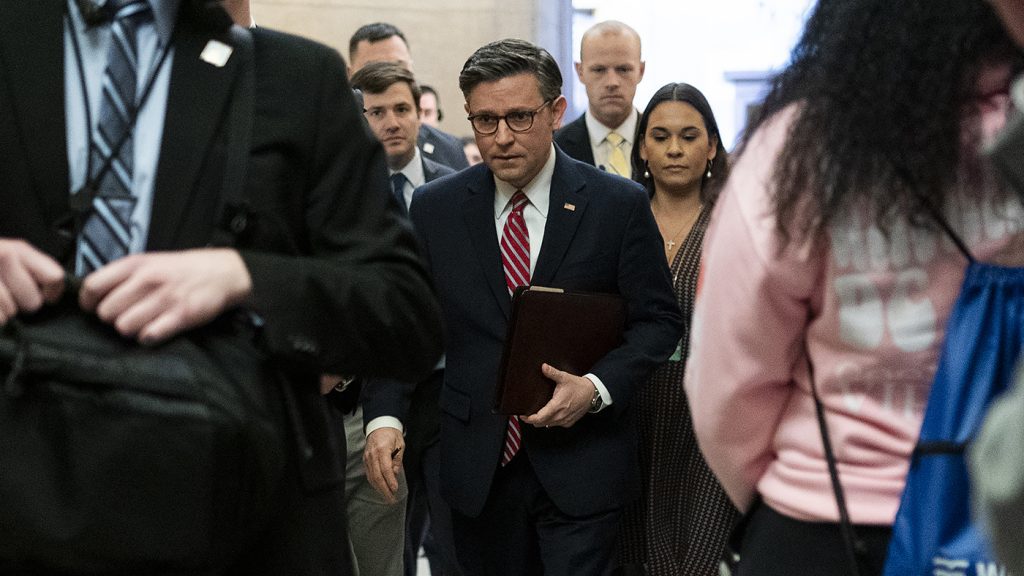The House agreed to a $1.2 trillion government funding bill on Friday, and sent it to the Senate just before the deadline, officially completing the fiscal 2024 appropriations process in the lower chamber.
The bill includes six funding bills and was approved by the House with a 286-134 vote, shortly before several agencies and programs were at risk of running out of funding.
The Senate is expected to promptly consider the bill in hopes of finalizing it before midnight to prevent a funding lapse and start their two-week Easter recess. President Biden has indicated he will sign the bill.
The successful House vote marks the end of the fiscal year 2024 appropriations process in the lower chamber, which had been prolonged with four short-term extensions, resulting in the removal of a sitting Speaker and sparking conflicts between hardline conservatives and GOP leadership.
Key lawmakers are pleased to conclude the lengthy process.
“I’m happy and relieved to finally close out fiscal year 2024,” Rep. Rosa DeLauro (Conn.), the top Democrat on the Appropriations Committee, expressed on the floor.
The vote is also a victory for Speaker Mike Johnson (R-La.), who prevented a shutdown, successfully passed the package despite strong conservative criticism, and avoided the need for a large end-of-year omnibus spending bill, which conservatives dislike. However, hardliners have criticized the pair of funding bills — known as minibuses — as a two-part omnibus.
However, Johnson faces significant challenges ahead.
Rep. Marjorie Taylor Greene (R-Ga.), one of his leading critics, hinted at bringing a motion to vacate against Johnson on Friday — the same process that led to the removal of his predecessor, former Speaker Kevin McCarthy (R-Calif.) — following his support of the trillion-dollar spending package.
“We will be making decisions on a minute-by-minute basis today and I urge you to watch and see what happens,” she said on Steve Bannon’s “War Room” podcast, adding that listeners should “stay tuned.”
Johnson has consistently stated that he is not worried about the threat to his leadership position.
Greene’s threat reflects the frustrations expressed by conservatives throughout the appropriations process, which has spanned several months. They criticized the hefty price tag, inclusion of various spending priorities, the exclusion of some of their controversial policy riders, and the process by which the bill was brought to the floor.
Johnson bypassed the “72-hour rule,” giving lawmakers about a day and a half to read the legislative text. He also brought the bill to the floor under suspension of the rules, which removed conservatives’ ability to block the measure on a procedural vote but required two-thirds support for passage.
The 1,012-page bill allocates $1.2 trillion in funding for the Defense, Homeland Security (DHS), Labor, Health and Human Services, State, as well as general government, financial services, and foreign operations departments.
Defense spending increases by more than three percent, as agreed last year between President Biden and House GOP leadership to limit federal spending. Nondefense funding remains about the same as the previous fiscal year.
Lawmakers are unhappy about having to vote on a large funding package, which was introduced late at night the day before – a common practice in Washington. However, members on both sides are already promoting a list of successes for them and criticisms against the other side.
Republicans highlight investments on the border that they say allow for a stronger focus on enforcement, including funding for 22,000 Border Patrol agents, enhancements for border security technology, and funding for 41,500 detention beds.
The bills do not make the significant cuts House Republicans wanted in their funding proposals from last year, but the party has also emphasized what they see as a change from previous years when both sides would negotiate over parity between defense and nondefense funding increases.
Some programs experiencing smaller reductions in the package include the Federal Trade Commission, the Federal Emergency Management Agency, the Cybersecurity and Infrastructure Security Agency, and the Office of National Drug Control Policy.
Meanwhile, Democrats have celebrated preventing the deep funding cuts advocated by Republicans, as well as a series of controversial measures, including those targeting abortion access and diversity initiatives.
The party has focused on funding increases secured in early childhood education and health programs, including Head Start, Child Care and Development Block Grants, and the Low Income Home Energy Assistance Program.
The package also raises funding for the National Institutes of Health, the Centers for Disease Control and Prevention, Substance Abuse and Mental Health Services Administration, and the Health Resources and Services Administration.
However, the bill has also received criticism from both ends of the political spectrum.
Conservatives have criticized funding in areas like FBI construction and certain Democratic-supported community projects, while opposing the overall funding levels in the package.
Progressives in both chambers have also objected to a compromise secured by Republicans blocking funding to a key United Nations agency that provides relief for Palestinian refugees, known as UNRWA.
“Do they consider a win the fact that children are starving to death in Gaza and are going to be unable to get the food and medical supplies they need because of the lack of funding to UNRWA?” Sen. Bernie Sanders (I-Vt.) said to The Hill. “If that’s a win, I’d hate to see what a loss looks like.”









